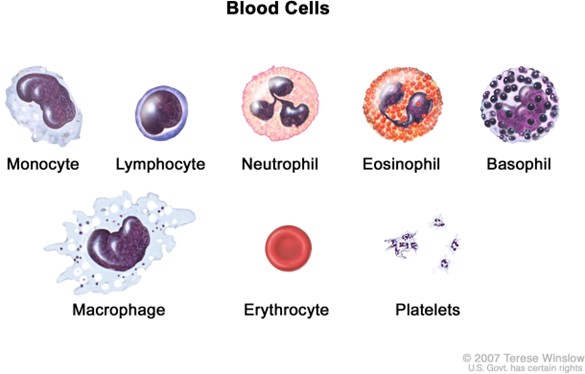Which of the following are agranulocytes?
Basophils.
Monocytes.
Neutrophils.
Eosinophils.
The Correct Answer is B
Monocytes are a type of agranulocytes, which are white blood cells that lack visible granules in their cytoplasm.
Agranulocytes also include lymphocytes, which are involved in adaptive immunity.
Choice A is wrong because basophils are a type of granulocytes, which are white blood cells that have granules in their cytoplasm.
Granulocytes also include neutrophils and eosinophils, which are involved in innate immunity.
Choice C is wrong because neutrophils are also a type of granulocyte.
Neutrophils are the most abundant white blood cells and are responsible for phagocytizing bacteria and fungi.
Choice D is wrong because eosinophils are also a type of granulocytes. Eosinophils are involved in allergic reactions and parasitic infections.
Normal ranges for white blood cells vary depending on age, gender, and health status, but generally, they are between 4,000 and 11,000 cells per microliter of blood.
Nursing Test Bank
Naxlex Comprehensive Predictor Exams
Related Questions
Correct Answer is A
Explanation
Red blood cells do not contain a large nucleus; in fact, they do not contain a nucleus at all when they are mature.
This is an adaptation that allows them to carry more hemoglobin, the protein that binds oxygen, and to squeeze through narrow capillaries.
Choice B is wrong because it contradicts the fact that red blood cells are enucleated (lacking a nucleus) in humans and most mammals.
Some vertebrates, such as birds and fish, have nucleated red blood cells, but they are not thick near the center and thin around the rim of the cell.

Correct Answer is A
Explanation
A monocyte is a type of white blood cell that is markedly larger than a red blood cell and has a large kidney-shaped nucleus.

Monocytes are involved in defending the body against infectious diseases and foreign materials.
Choice B is wrong because a basophil is a type of granular white blood cell that has a lobed nucleus and stains purple with basic dyes.
Basophils are involved in allergic reactions and inflammation.
Choice C is wrong because a neutrophil is a type of granular white blood cell that has a multilobed nucleus and stains pale pink with neutral dyes.
Neutrophils are involved in phagocytosis and killing bacteria.
Choice D is wrong because an eosinophil is a type of granular white blood cell that has a bilobed nucleus and stains red-orange with acidic dyes.
Eosinophils are involved in combating parasitic infections and allergic responses. The normal ranges of different types of blood cells are:
Red blood cells: 4.5 to 5.9 million per microliter (mcL) for males, 4.1 to 5.1 million per mcL for females
White blood cells: 4,000 to 11,000 per mcL for both males and females
Platelets: 150,000 to 450,000 per mcL for both males and females
Whether you are a student looking to ace your exams or a practicing nurse seeking to enhance your expertise , our nursing education contents will empower you with the confidence and competence to make a difference in the lives of patients and become a respected leader in the healthcare field.
Visit Naxlex, invest in your future and unlock endless possibilities with our unparalleled nursing education contents today
Report Wrong Answer on the Current Question
Do you disagree with the answer? If yes, what is your expected answer? Explain.
Kindly be descriptive with the issue you are facing.
